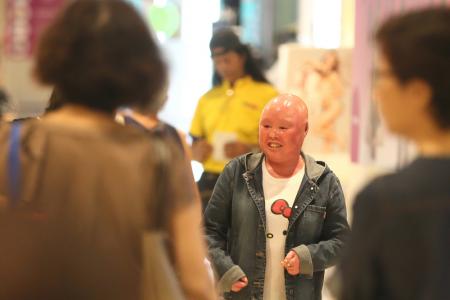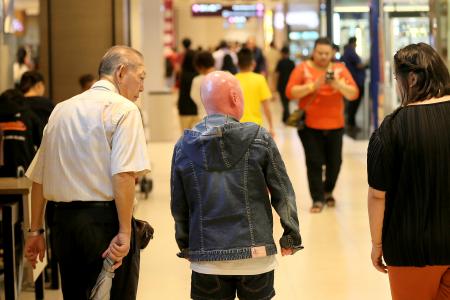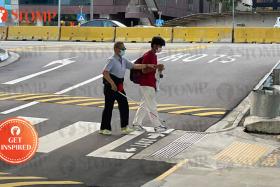Woman with rare skin disorder hopes for more acceptance
A girl with a skin disorder was almost bumped off a plane recently. TAN TAM MEI (tammei@sph.com.sg) speaks to a S'porean with the same condition about the challenges of being treated normally
When she walks down the street, people do a double take, but not for the usual reasons, said Miss Ng Poh Peng.
Miss Ng, 25, was born with congenital ichthyosis, a rare and incurable hereditary skin disorder that causes her skin to flake off like fish scales, exposing raw-looking wrinkled pink skin underneath.
"I've noticed people looking all the time, but I find it funny. Sometimes they turn to look even after walking past me.
"I tell myself that they're looking at me because I am special," said Miss Ng, who works from home as an online content administrator for an environmental volunteer group.
We spoke to Miss Ng after a recent incident and a survey highlighted how people react to those who look different.
Earlier this month, the mother of a 10-year-old girl with a similar condition as Miss Ng's said her daughter had a harrowing experience on a plane because of how she looked and was almost stopped from taking that flight.
A recent Lien Foundation survey also found that Singaporeans support the idea of inclusion, but do not practise it.
Miss Ng said she used to be hurt by the stares and comments, but has learnt not to think too much about it.
She said: "What I am most sure of is that my parents love me. So I'm able to look beyond the mean things people say.
"It's a bit hard to ignore sometimes, but the comments go in one ear and come out the other."

Miss Ng's condition causes her skin to dry out and peel and she has to apply moisturiser every few hours. She uses about two bottles of moisturiser every day and tries to stay indoors or in air-conditioned areas.
However her skin has worsened recently as the air-conditioner at home is spoilt and the weather has been erratic, she said.
"We can't afford to repair it right now, so I'm just trying my best to stay out of the heat and rain," said Miss Ng.
The air-con is a low priority because her parents are saving to upgrade to a four-room flat, so that her brother does not have to share a room with his two sisters, as he does in their current three-room HDB flat.
During the interview on Wednesday, Miss Ng and The New Paper team went for a drink at a neighbourhood hawker centre.Passers-by stole second glances at Miss Ng, who was dressed in T-shirt, shorts and a denim jacket.
She said: "I'm not really bothered by how they look at me. But I do hope people treat those with disabilities a little better.
"We can't control how these people feel or how they look at us. But I hope Singaporeans can react in a kinder way and not be rude or impolite or say hurtful words."
She said the worst remark she has heard was someone who said that her parents' lives would be better without her around.
"That was really hurtful. But later, my mother encouraged me and said they were happy that I had outlived all the doctors' expectations," she said.
Despite these nasty experiences, Miss Ng feels that people have become more accepting of those with disabilities.
Most people she meets now react to her condition with curiosity and concern, especially after reading about her in TNP.
The paper first broke her story in 1991 when she was eight months old. Readers donated more than $295,000 to help her family pay for her medical care.
Miss Ng said: "I don't mind people asking (about my skin), because I'll explain it to them. It would be good if more people understand (such conditions).
However, she added that not everyone will know the various disorders and disabilities and at the end of the day, it was more important for people treat to each other with kindness.
Miss Ng's mother, Madam Cheng Fong Mui, 50, a hawker's assistant, said her daughter's positive attitude is something that has been built up over the years.
She said: "She used to avoid going out. But now, she isn't bothered by people looking. She's become stronger and more courageous."
I'll help you understand, she told me
I was not sure if Miss Ng Poh Peng would be comfortable with my suggestion of taking a walk around the mall and hawker centre near her place, as she had earlier mentioned that it would typically draw looks and stares from passers-by.
But she was game for it.
And she even told me she hoped it would help me understand a little about what those who are different go through every day of their lives.
Throughout the 45-minute stroll around the neighbourhood centre, the looks and reactions were hard to ignore.
I noticed mouths drop and people shuffle out of our path.
Children, adults and even the elderly took notice of her skin - but not once did she flinch.
The amount of confidence and assurance that Miss Ng had throughout was admirable.
I'm not sure if it was because she was accustomed to it, or if she was just ignoring the onlookers.
But she was so at ease, happily chatting about topics such as her favourite yogurt shop at the mall.
She also revealed her aspirations to be a counsellor.
"I like to listen to people, and I think I can share my experiences with them. I hope one day I can help others who are going through tough times," she said. - Tan Tam Mei
Airline discriminated against daughter, says mother
On April 9, a couple and their two daughters boarded AirAsia flight QZ508 from Bali to Singapore.
The younger daughter, 10, has ichthyosis, a rare genetic condition similar to that of Miss Ng Poh Peng's.
In an open letter posted on her blog on June 7, and later added as a comment on the AirAsia Facebook page, the girl's mother detailed what she said was the "worst experience of her (daughter's) life".
The mother said an AirAsia cabin crew member approached them and said: "Excuse (me), what is wrong with your daughter?"
Despite the mother explaining that her daughter was fine and her appearance was the result of a genetic condition, she said the staff member persisted, saying: "She does not look fine. She looks terrible. What is wrong with her?"
Soon after, an AirAsia ground crew member came on board and told the family to disembark because they believed that her daughter was a "threat" to other passengers, she said.
She added that the crew also said the girl's condition could "infect" other passengers.
The mother said the staff backed down only when she threatened to sue the airline, but by then her daughters were in tears.
The mother wrote: "Your staff managed to destroy the belief that I built in my child... that the world will not judge her for her appearance but for the content of her character... My daughter was judged, she was sentenced and her self-esteem was destroyed because of how she looked."
In response to queries from The New Paper, an AirAsia spokesman said they were aware of reports of an incident involving a guest on board that particular flight.
The spokesman said the airline takes the matter seriously and a full investigation is underway.
He added that no passengers were offloaded from the flight and the airline remains committed to ensuring the safety and comfort of all its guests.
EXPERTS: LACK OF UNDERSTANDING OF DISABILITIES
The issue of inclusiveness came under the spotlight last month after a survey by the Lien Foundation found that Singaporeans support the idea of inclusion, but do not walk the talk.
In a survey of 1,000 people about their attitudes towards children with disabilities, close to two-thirds said they believe that Singaporeans are willing to share public spaces with children with special needs, but are not willing to interact with them.
Findings also suggested that Singaporeans are tolerant towards, rather than accepting of, those with special needs.
As for the disabled themselves, a survey of 1,000 people with disabilities, released by the National Council of Social Service on June 2, found that 62 per cent did not feel they are included, accepted, given opportunities to contribute or reach their potential by society.
Social agencies and support groups The New Paper spoke to agreed, adding that inclusiveness of those with disabilities is something that should be improved.
DON'T KNOW HOW TO REACT
Mr Abhimanyau Pal said there is a lack of understanding about special needs in Singapore - be it physical disabilities, intellectual disabilities, autism or other diagnoses. As a result, people do not know how to react or interact with these individuals.
Mr Pal, the executive director of SPD,formerly known as the Society for the Physically Disabled, said: "If we do not have enough awareness of disabilities, the way we relate to individuals with disabilities can make life challenging and painful for them and their caregivers."
Mr Samuel Koh, 59, executive director of Christian Outreach to the Handicapped, said: "I think the study isn't too far wrong. If people are tolerant, that's good because it's the first step moving towards acceptance."
He said Singaporeans might be more accepting of those with "visible" disabilities.
"If you see someone struggling on a wheelchair, you might go forward to help. But if the person is intellectually disabled, it might not be so obvious," he said.
He said society might be more accepting if they are aware of the spectrum of disabilities.
But inclusiveness is a two-way street, said Handicaps Welfare Association president Edmund Wan.
The retired banker, 72, walks with a limp because he was stricken with polio as a child. As a disabled person, he believes that those with disabilities have a part to play.
He said: "We are the ones with the disability, we know what we need. We can't expect everyone to know and understand our needs, especially if it's an 'unseen' disability like epilepsy or Tourette's syndrome.
"We can't educate the whole population, but we can slowly educate those around us. Mutual understanding will only come about when we are all willing to learn and willing to share."
Get The New Paper on your phone with the free TNP app. Download from the Apple App Store or Google Play Store now




